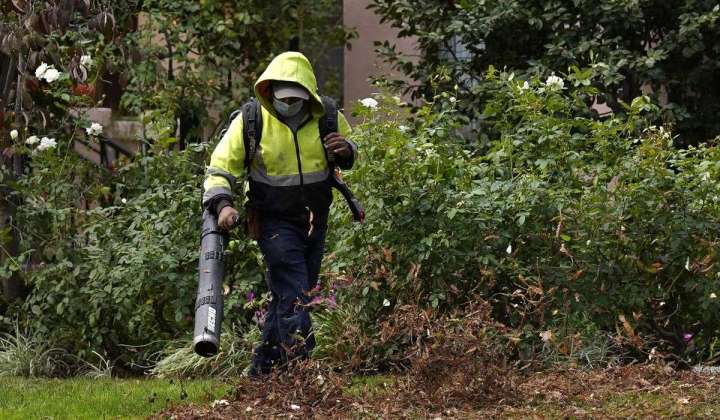Gas-powered lawn care meets sharp blade of state, local laws

The days are numbered for gasoline-powered lawn care equipment such as mowers, leaf blowers and string trimmers with Democratic officials increasingly looking to ban them.
This endeavor, which cities and states across the country are pursuing, is meant to combat climate change while assuaging complaints of noisy machines cutting their morning sleep short or interrupting otherwise quiet neighborhoods.
California’s statewide ban on all gasoline-powered lawn care equipment starts in 2024. New York City and Boston have considered banning gas-powered leaf blowers. Montclair, New Jersey, and Burlington, Vermont, have seasonal bans on leaf blowers.
In Lexington, Massachusetts, voters in March approved continued restrictions on the use of gas-powered leaf blowers and bans on them in 2025.
Despite its location in oil-rich Texas, Dallas is debating a ban on all gas-powered landscaping tools. Dallas would join more than 100 other U.S. cities to put the kibosh on gas-powered lawn mowers and the like.
“We don’t use dental technologies from the ’80s, so why should we still be using lawn equipment from the ’80s?” Dallas City Council member Paula Blackmon, a Democrat, told The Washington Times. “Technology has changed. Let’s evolve, let’s move on from it and adapt, and it’s OK to say this is not the instrument that we want anymore.”
SEE ALSO: At least 15 people dead from dangerous winter storm conditions
For lawn care businesses and their customers, the grass isn’t always greener on the climate-friendly side of the fence. Some business owners say battery-powered alternatives just don’t cut it because of upfront costs and inadequate performance.
“People are interested in going green, but it presents an interesting conflict. It’s almost a Catch-22,” Mitch McGowan, owner of Dot Dirt Organic Landscapes in Dallas, said in an interview. “Do they want to spend that much extra money for the extra labor hours, because your blowers, mowers and trimmers just aren’t as powerful?”
The average battery life for lawn care equipment is about 75 minutes, said Mr. McGowan, raising logistical questions about how companies like his can find suitable alternatives to gas-powered equipment they use for eight hours or more per day.
One potential solution, he said, is to buy an inverter that can charge equipment using the power from his truck. However, that works only when the truck is running, and even then, it doesn’t provide enough power to fully recharge the equipment.
Mr. McGowan said another potential workaround is the installation of solar panels on the top of the truck that can continuously recharge, but that can cost around $4,000 and provide only a fraction of the power on cloudy days.
All of these additional expenses and time to recharge equipment would mean higher costs for customers.
“I guarantee you there’d be a 30% price rise immediately just because of the commercial-level mowers,” he said. “Customers are not welcome to that at all.”
Ms. Blackmon acknowledged the monetary and logistical challenges to businesses but said sacrifices sometimes have to be made for the greater good.
“I understand that they’re concerned about the power, but I do believe that if this is something that our communities value, then concessions have to be made and people have to understand that,” she said.
Last year, California became the first state to ban manufacturers from selling new gas-powered lawn care equipment, similar to its ban on purchasing new gas-powered vehicles. The ban on lawn care equipment will go into effect in 2024.
The California Air Resources Board estimates that using a lawn mower for one hour produces emissions equivalent to 300 miles of driving. Using a leaf blower for the same amount of time, the state board estimated, equates to driving 1,100 miles.
The board says Californians have more than 16 million gas-powered lawn care devices, roughly 1.5 million of which are owned by commercial businesses.
A ban in the nation’s capital, which took effect at the start of this year, went a step further than barring new sales. It prevents the use of gas-powered leaf blowers altogether and imposes a $500 fine for first offenses and $1,000 for repeat violations.
Bans on gas-powered equipment can also be costly for taxpayers. California set aside $30 million last year to help private residents and businesses make purchases to comply with the law.
Ms. Blackmon said Dallas is considering financial help, such as a buyback program, but she emphasized that any aid would go only so far because larger businesses typically upgrade their equipment every few years.
“I don’t want to become the city that is now replacing everything when they’re going to replace it anyway,” she said.






